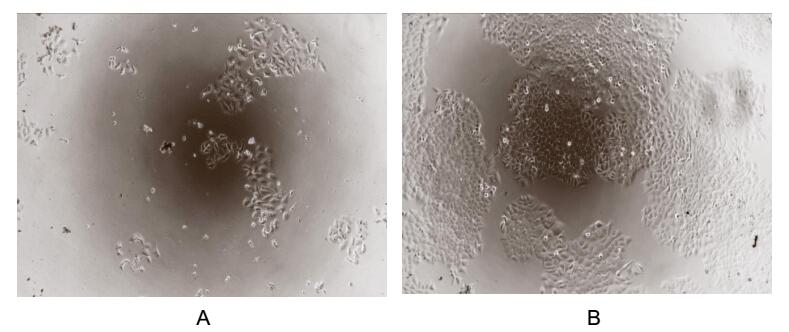Active Transforming Growth Factor Beta 2 (TGFb2)
TGF-B2; TGF-Beta2; G-TSF; LAP; Cetermin; Polyergin; Latency-associated peptide; BSC-1 cell growth inhibitor; Glioblastoma-derived T-cell suppressor factor
- Product No.APA218Ga01
- Organism SpeciesChicken (Gallus) Same name, Different species.
- Buffer FormulationPBS, pH7.4, containing 0.01% SKL, 5% Trehalose.
- TraitsFreeze-dried powder
- Purity> 90%
- Isoelectric Point8.9
- ApplicationsCell culture; Activity Assays.
- Download Instruction Manual
- UOM 10µg50µg 200µg 1mg 5mg
-
FOB
US$ 246
For more details, please contact local distributors!US$ 615
For more details, please contact local distributors! US$ 1230
For more details, please contact local distributors! US$ 3690
For more details, please contact local distributors! US$ 9225
For more details, please contact local distributors!
ACTIVITY TEST of the Active Transforming Growth Factor Beta 2 (TGFb2)

Transforming growth factor beta (TGF-β) is a multifunctional cytokine belonging to the transforming growth factor superfamily. The TGF-β superfamily includes endogenous growth inhibiting proteins; an increase in expression of TGF-β often correlates with the malignancy of many cancers and a defect in the cellular growth inhibition response to TGF-β. Its immunosuppressive functions then come to dominate, contributing to oncogenesis. To test the effect of TGF-β on inhibit HGF-dependent proliferation, HepG2 cells were seeded into triplicate wells of 96-well plates at a density of 2,000 cells/well and allowed to attach, replaced with serum-free overnight, then the medium was replaced with 2% serum standard DMEM including 1ng/mL HGF prior to the addition of various concentrations of recombinant chicken TGF-β. After incubated for 96h, cells were observed by inverted microscope and cell proliferation was measured by Cell Counting Kit-8 (CCK-8). Briefly, 10µL of CCK-8 solution was added to each well of the plate, then the absorbance at 450nm was measured using a microplate reader after incubating the plate for 1-4 hours at 37℃. The inhibitory effect of TGF-β on HGF-dependent proliferation of HepG2 cells observed by inverted microscope was shown in Figure1. Cell viability was assessed by CCK-8 assay after incubation with recombinant TGF-β for 96h. The result was shown in Figure 2. It was obvious that TGF-β significantly decreased cell viability of HepG2 cells. (A) HepG2 cells cultured in DMEM, stimulated with 1µg/mL TGF-β for 96h; (B) Unstimulated HepG2 cells cultured in DMEM for 96h.
Figure. The inhibitory effect of TGF-β on cell proliferation of HepG2 cells.

Figure. TGF-β inhibit cell proliferation of HepG2 cells.
USAGE of the Active Transforming Growth Factor Beta 2 (TGFb2)
Reconstitute in 10mM PBS (pH7.4) to a concentration of 0.1-1.0 mg/mL. Do not vortex.
STORAGE of the Active Transforming Growth Factor Beta 2 (TGFb2)
Avoid repeated freeze/thaw cycles. Store at 2-8°C for one month. Aliquot and store at -80°C for 12 months.
STABILITY of the Active Transforming Growth Factor Beta 2 (TGFb2)
The thermal stability is described by the loss rate. The loss rate was determined by accelerated thermal degradation test, that is, incubate the protein at 37°C for 48h, and no obvious degradation and precipitation were observed. The loss rate is less than 5% within the expiration date under appropriate storage condition.
INCREMENT SERVICES
BCA Protein Quantification Kit
Molecular Mass Marker for Protein
Monoclonal Antibody Customized Service
Polyclonal Antibody Customized Service
Protein Activity Test Experiment Service
Electrophoretic Mobility Shift Assay (EMSA) Experiment Service
Buffer
Lentivirus Packaging Experiment Service
Adenovirus Packaging Experiment Service
Real Time PCR Experimental Service
Spike RBD Protein (S-RBD)
Protein G
Protein A
Related products
| Catalog No. | Organism species: Chicken (Gallus) | Applications (RESEARCH USE ONLY!) |
| APA218Ga01 | Active Transforming Growth Factor Beta 2 (TGFb2) | Cell culture; Activity Assays. |
| RPA218Ga01 | Recombinant Transforming Growth Factor Beta 2 (TGFb2) | Positive Control; Immunogen; SDS-PAGE; WB. |
| PAA218Ga01 | Polyclonal Antibody to Transforming Growth Factor Beta 2 (TGFb2) | WB; IHC; ICC; IP. |

